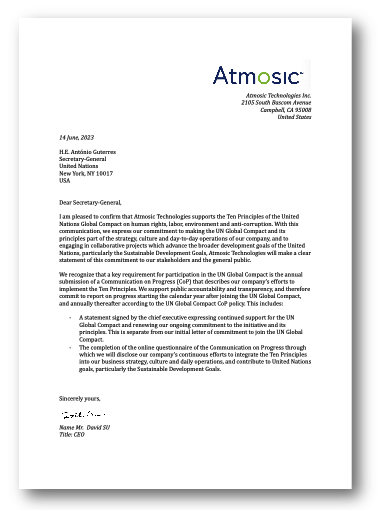Commitment
Doing the right thing doesn't have to be difficult
People familiar with Atmosic know that it is our mission to lead the way in creating a cleaner and more sustainable Internet of Things. Atmosic's vision of a better world doesn't stop with just the products we create, it's part of who we are as a company.
Atmosic believes in sustainability in the broader sense and has committed to the ten principles as defined by the United Nations that are aimed at promoting a value-based approach to business in the areas of:
- Human Rights
- Labour
- Environment
- Anti-Corruption
UN Global Compact
A voluntary initiative based on CEO commitments to implement universal sustainability principles.
A multi-year strategy of the UN Global Compact is to drive business awareness and action in support of achieving Sustainable Development Goals by 2030.
The Ten Principles of the UN Global Compact
Corporate sustainability starts with a company’s value system and a principles-based approach to doing business. This means operating in ways that, at a minimum, meet fundamental responsibilities in the areas of human rights, labour, environment and anti-corruption. Responsible businesses enact the same values and principles wherever they have a presence, and know that good practices in one area do not offset harm in another. By incorporating the Ten Principles of the UN Global Compact into strategies, policies and procedures, and establishing a culture of integrity, companies are not only upholding their basic responsibilities to people and planet, but also setting the stage for long-term success.
The Ten Principles of the United Nations Global Compact are derived from: the Universal Declaration of Human Rights, the International Labour Organization’s Declaration on Fundamental Principles and Rights at Work, the Rio Declaration on Environment and Development, and the United Nations Convention Against Corruption.
Human Rights
Principle 1: Businesses should support and respect the protection of internationally proclaimed human rights; and
Principle 2: make sure that they are not complicit in human rights abuses.
Labour
Principle 3: Businesses should uphold the freedom of association and the effective recognition of the right to collective bargaining;
Principle 4: the elimination of all forms of forced and compulsory labour;
Principle 5: the effective abolition of child labour; and
Principle 6: the elimination of discrimination in respect of employment and occupation.
Environment
Principle 7: Businesses should support a precautionary approach to environmental challenges;
Principle 8: undertake initiatives to promote greater environmental responsibility; and
Principle 9: encourage the development and diffusion of environmentally friendly technologies.
Anti-Corruption
Principle 10: Businesses should work against corruption in all its forms, including extortion and bribery.

